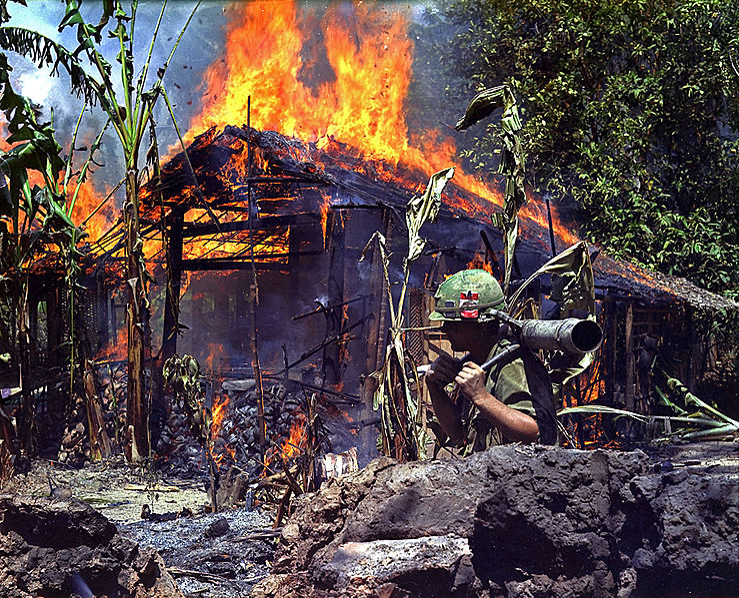
Here is the powerpoint on the Vietnam war
The Vietnam war is believed by many to be the biggest mistake in US history. It traumatized and divided the American people for decades, and did immense harm to the image of the United States in the world. Plus, you know, they lost. Here’s how the US got into this mess, and what a mess it was.
By Haavard Pettersen
1945: The US tries to help France get back its colony
Japan had occupied Vietnam during WWII, and many Vietnamese had fought against the Japanese rule. When the Japanese surrendered in 1945, the Vietnamese believed they would finally get their independence. But France had other ideas. France had ruled Vietnam as a colony before the Japanese invasion, and now France wanted its colonies back. Britain had understood that imperialism was an idea that was now completely out of fashion. The idea that some people had the right to rule others because they were a different race was something they fought Hitler to defeat. India and Pakistan would get their independence in 1947 and most of Africa by 1960. France, however, didn’t want to understand. They were eager to restore their great power status, and to do that, they thought, they needed their empire.
In 1945, however, France was not in a position to hold on to an empire. France had been occupied for five years by the Germans, and its military and ecomic power lay in ruins. They turned to their big ally, the USA, for help, and the first French troops were transported to Vietnam on US ships. When war broke out between France and the Vietnamese nationalists, the US supported the French militarily.
Why did the US support the French colonial regime? This is stranger than you might think. The USA, as it happens, used to be a colony (or 13 colonies, actually), and fought a war to win independence from the British. Thus, the country had always been against colonialism, (even if they themselves got a colony in the Phillippines at the height of the imperialist period). Should they now deny a people the freedom they themselves had fought for? Many politicians in the US did not think so, but still the US supported the French. The explanation is that Vietnamese nationalists, called Viet Minh, were Communists. Fighting Communism was considered much more important than fighting colonialism.
1946-1954: Vietnam fights for independence
There was a war of independence between France and Vietnamese nationalists (the Viet Minh) between 1946 and 1954. From 1949, the Communists got support from Mao’s China, and the French got support from the United states. This was sort of in keeping with the Truman doctrine: any country needing military help to avoid a Communist takeover, would get it from the US. The only trouble is that his meant propping up a colonial regime. During that war a French General Leclerc makes a gloomy prediction about the chances of holding on to Vietnam:
«It would take 500,000 men to do it, and even then, it probably couldn’t be done»
This turned out to be completely true.
1954: The French lose – the US supports the South.
In 1954, the French suffer a surprise defeat at the battle of Dien Bien Phu. Vietnam is given independence, but divided in two; a Communist «Democratic Republic of Vietnam» in the North and a non-Communist «Republic of Vietnam» in the South. Both halves ended up being brutal dictatorships. In the south, there was an insurgency (armed revolt) by a Communist guerrilla called the Viet Cong. The South received military aid and training from the United States in their fight against these guerrillas. Again, this is in accordance with the Truman Doctrine.
However, the Viet Cong’s populariy was growing, and South Vietnam was in trouble. In the peace treaty, there were plans for elections in both parts of Vietnam, and possibly a reunion. These elections were never held, because the South and the USA feared that the Communists would win. The Communists were seen by many as the «real» Vietnamese leadership, since they had fought both the Japanese and the French.
The Domino Theory – US involvement grows
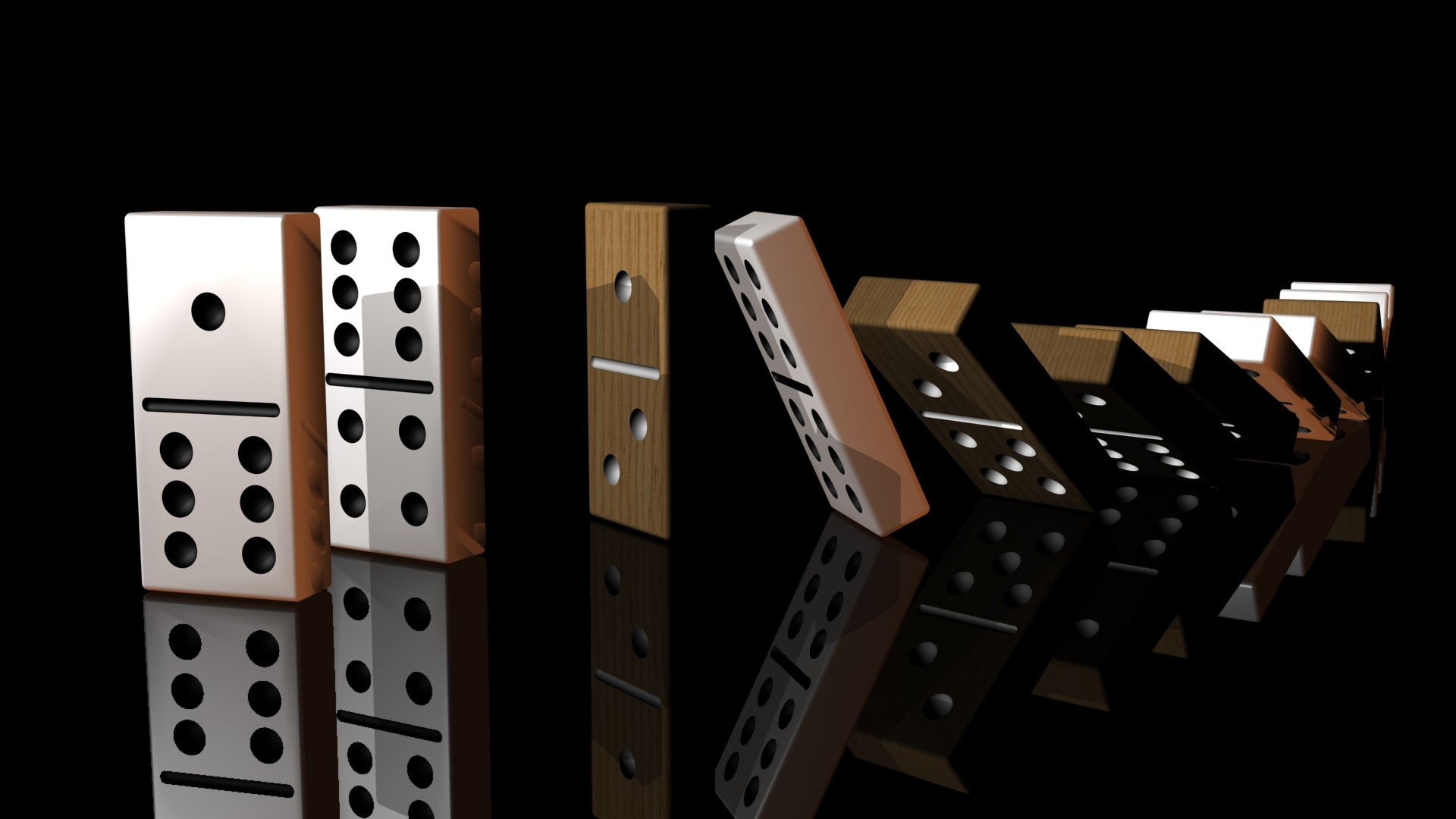
New president John F. Kennedy had echoed the Truman Doctrine when he said in his first speech as President that the United States would «support any friend, oppose any foe” in the fight against communism. However, he was privately skeptical to the idea behind US involvement, namely the Domino Theory. This theory states that if South Vietnam fell, then all the other countries in Asia would fall one by one, until the US would face a Communist world. JFK was shot in 1963, and his successor, Lyndon B. Johnson, was a Domino Theory enthusiast. He started sending more and more «military advisors» to South Vietnam to help their war efforts against these troublesome Communist guerrillas.
1964: The Gulf of Tonkin incident: a lie that started a war
In 1964, an American gunship was fired upon by a North Vietnamse ship in international waters. Or they thought they had been fired upon. They were pretty sure they heard something….. Whatever actually happened, Lyndon B. Johnson got Congress to agree to step up military operations in South Vietnam, in reality involving the USA in a war that wasn’t called a war over an attack on an American ship that wasn’t an attack. Because the «Gulf of Tonkin» incident actually never happened. Thus, the whole Vietnam War was started because of a mistake, or even a lie.
Stuck: A war with no plan, no goal, no exit strategy
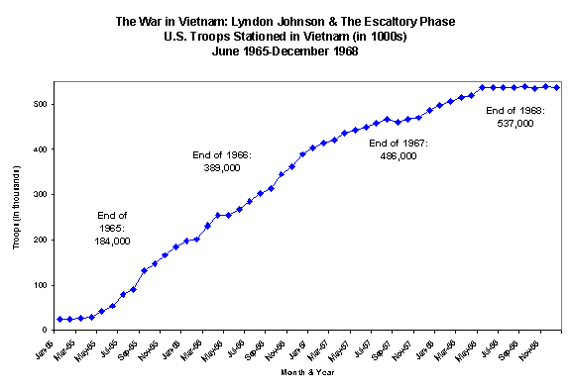
The first regular US soldiers began to be sent over in 1965. As the war went badly, they sent over more and more of them, until the number peaked at well over half a million in 1968. The «draft» was reintroduced, this lottery were some men/ boys were picked sort of at random for military service. And yet they didn’t win! These rice farmers held out against the mightiest military in the world. How is that possible?
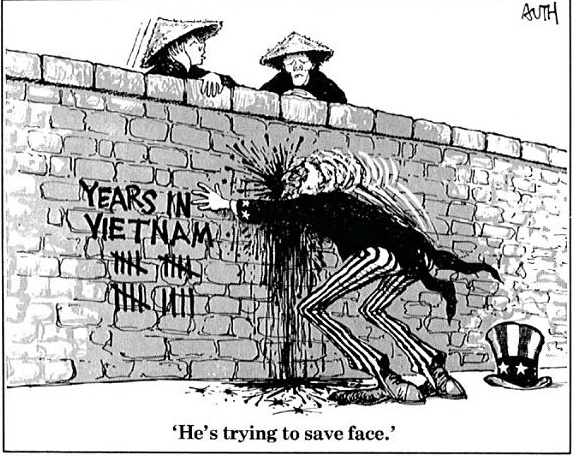
First of all, the Vietnam War was a guerrilla war. The US troops did not fight enemy soldiers in uniforms who stayed in camps and controlled territory. The enemy were ordinary rice farmers who looked just like ordinary rice farmers, because that’s what they were. When American soldiers went around trying to find them, any Vietnamese they met could be a member of the Viet Cong – the Communist guerrilla. Instead of meeting the Americans in open battle, they laid mines and booby traps (bombs attached to wires), they shot from behind trees or houses or holes in the ground. They hid in huge underground cave systems. In this type of war, the guerrillas win as long as they don’t lose. The Americans, however, lose as long as they don’t win.
Second, the Americans had no clear idea what they were trying to achieve. They simply did not have a definition of victory. When could they say that they had won? When every single Viet Cong soldier had been killed? That was clearly not going to happen. When 95 % of the country did not have Viet Cong presence? When there were fewer than x attacks per week? Sources reveal that the US leadership stumbled into the Vietnam war without having thought through these important questions.
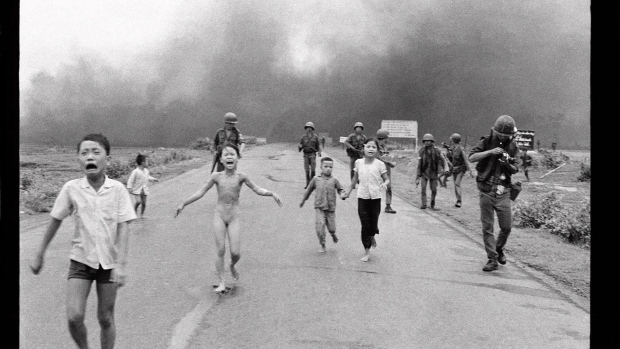
Third, the war became a media disaster. For the first time, people watched a war on TV. Every evening, there were new reports showing the grim realities of war. The harder the US military tried to win, the worse their image problem became. The US ended up committing atrocities (acts of extreme cruelty) that shocked and disgusted people both in the US and the rest of the world. They used a chemical called napalm, which is extremely sticky and flammable, to burn down trees and villages. Unfortunately, it has absolutely horrifying effects on people, who burn to death or suffer extreme pain. This is what happened to the children on the iconic photo above, showing burnt children running away from a napalm attack. They also sprayed a chemical called Agent Orange on the trees in the jungle, so they would shed their leaves and reveal where the Viet Cong bases in the jungle were. This chemical caused grotesque birth defects on thousands of Vietnamese babies, born without arms and legs and mental disabilities. The environmental effects on the forest were disastrous, and large parts of the country are basically poisoned even today, and so you cannot grow food there.
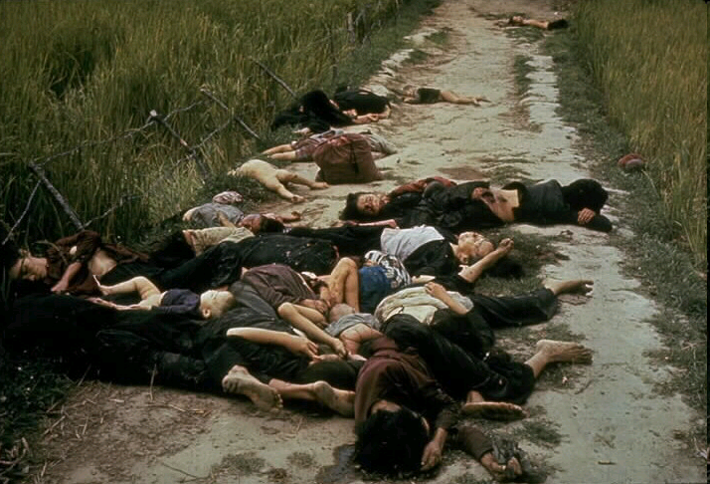
Since the Viet Cong looked exactly like Vietnamese civilians, the Americans had trouble knowing who to kill. The «body count», the press brief from the Pentagon where they reported how many Viet Cong they had killed, ended up being about how many they had killed, period. In one infamous case, US soldiers went into a village called My Lai, and started killing everyone, men, women and children. The graphic photos (above) were eventually leaked out to a horrified American public. How could their country do something like that?
In 1968, the US started a bombing campaign against North Vietnam, eventually dropping more bombs on that country than all the bombs dropped during the Second World War put together! However, this had about the same effect as the German bombing of Britain in 1940 and the allied bombing of Germany and Japan in 1945. In other words, just about nothing. Swedish Prime Minister Oluf Palme stood before the UN and said that «this is not warfare, it is a kind of torture».
The image of the United States as heroic defenders of freedom and democracy in WWI and WWII faded to a distant memory. More than half a million soldiers, horrific weapons like napalm and Agent Orange, the most intense bombing raids in the history of the world, massive human rights violations – the US did all these things and still they couldn’t win. However, they couldn’t just leave. Many people in the world depended on US military strength to feel safe, most notably in Europe. If the Americans just «chickened out» of Vietnam, that would send a signal of weakness. Maybe it would encourage the Soviets to try something….
The Americans couldn’t stay, and they couldn’t leave!
«Peace and love»
Massive protests against the Vietnam war gave rise to the counterculture movement. The young generation, born after WWII, protested against what they saw as a meaningless, cruel war waged by the parent generation, who wouldn’t have to fight in it. The hippies, as they were called, fought for «peace and love», grew their hair long and took mind-expanding drugs, and even though most young people were not hippies, they changed a lot of attitudes and culture in America and elsewhere. Without them, no rock or other modern types of music, no long hair on guys, sex before marriage would still be a huge no-no. All of this changed because of the Babyboomer Generation’s revolt against their parents, which was largely caused by the protest to the Vietnam War.
The US leaves – the North invades
Richard Nixon, who became president in 1969, promised «peace with honor. The plan was to leave the fighting to the Vietnamese, and pull the American soldiers out. In 1973, the last Americans left, and US Secretary of State Henry Kissinger and his Vietnamese colleague got the Nobel Peace Prize for their peace treaty. This is one of the most criticized Nobel Peace Prizes in history. Just two years later, North Vietnamese forces invaded South Vietnam. As an ultimate image of humiliation, the last Americans still in Saigon escaped on a helicopter from the roof of the American embassy.
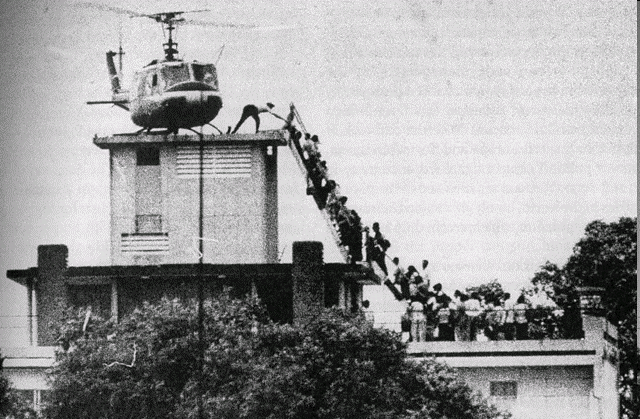
A divided country
Different attitudes towards the war sparked the generation gap between the younger generation and their parents. The younger generation, called the Babyboomers, born after WWII, were the ones who were sent out to fight in this war and most of them did not understand or accept it. Their parents, who had fought in WWII, did not understand or accept that their children refused to «do their duty» like they had done.
In hindsight, however, pretty much everyone today agrees that the war in Vietnam was one of the biggest mistakes in US history, if not the biggest. The US got involved in what was essentially a civil war in a country on the other side of the world for very poorly justified reasons, they did not really know how to win, or even have a definition of winning, and they used all the military power they had (except nuclear weapons), committed massive human rights violations against the population of a poor third world country, and yet they achieved precisely nothing!
Except 58.000 dead US soldiers, maybe as much as two million Vietnamese dead, and a permanent damage to the image of the United States.

